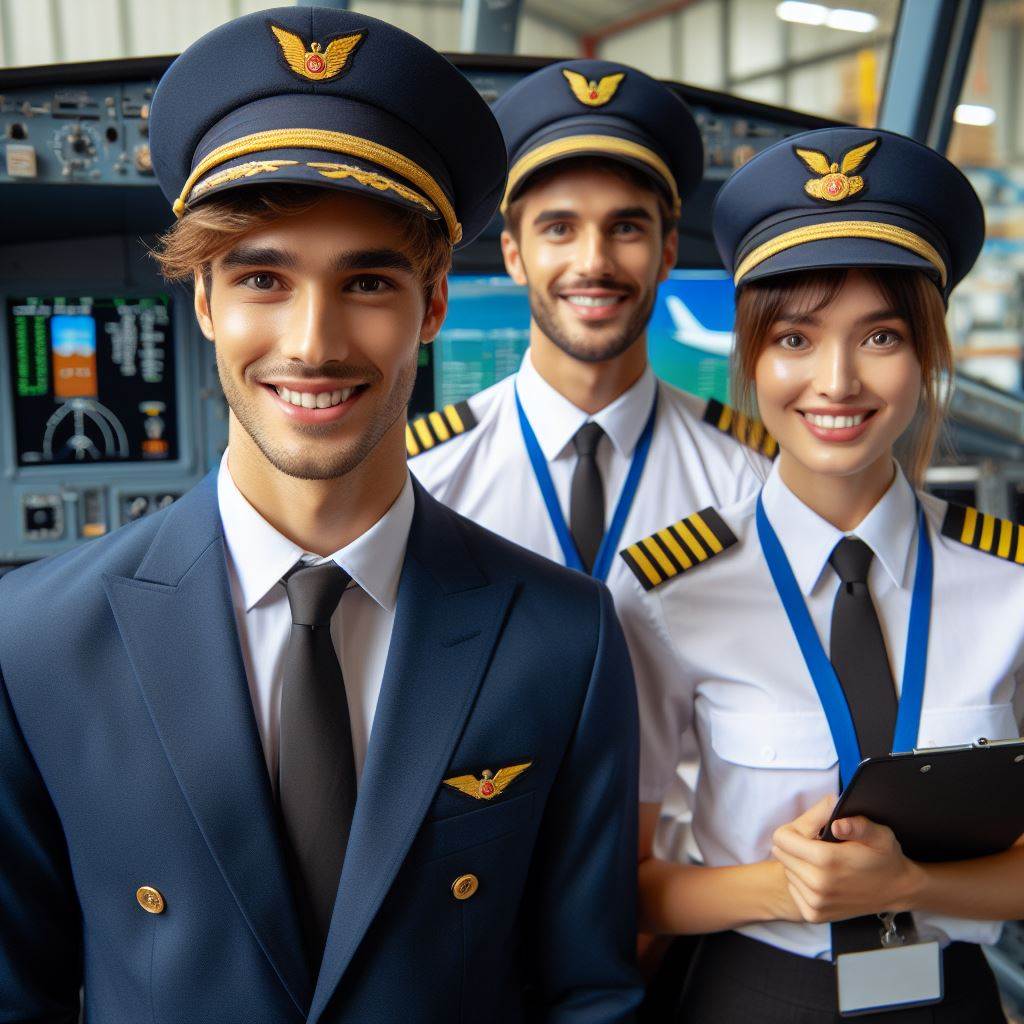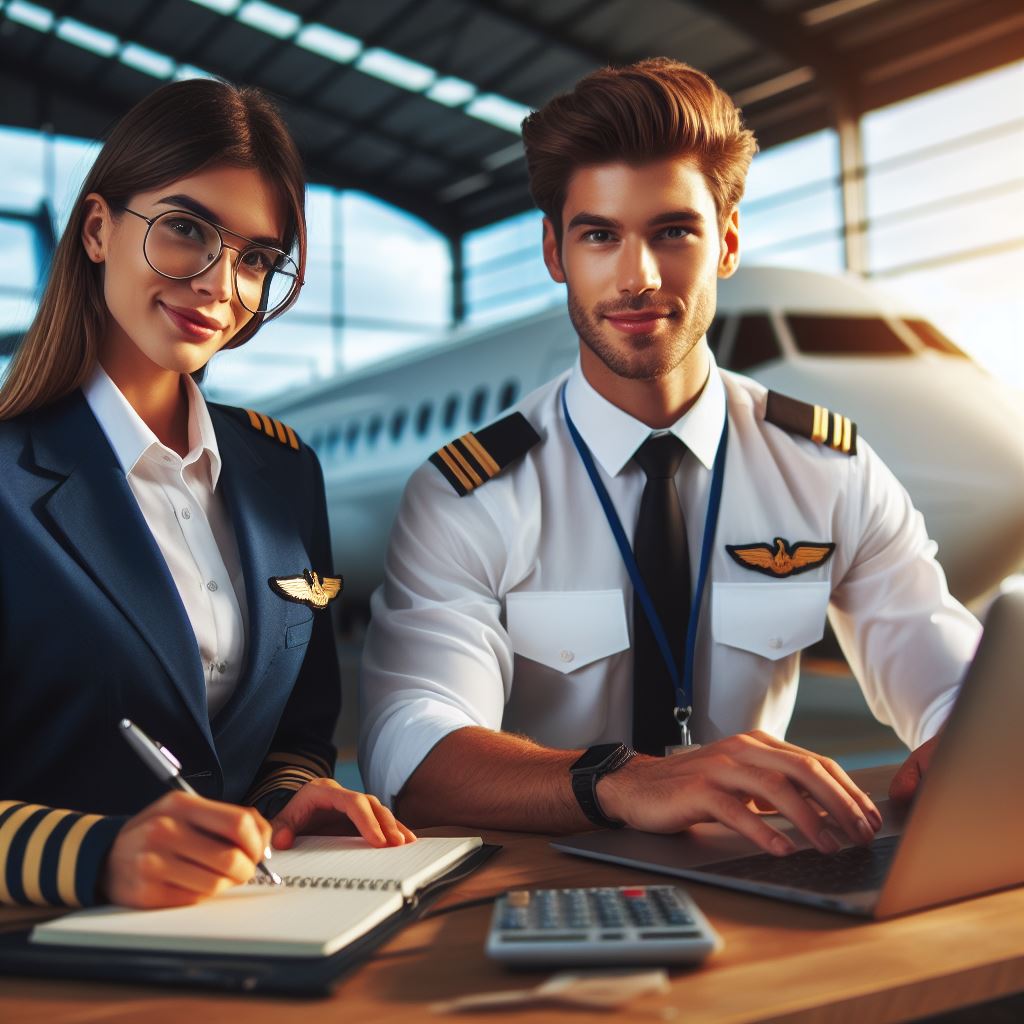Introduction
The importance of airline pilots in Australia
Airline pilots are an integral part of the aviation industry in Australia, ensuring the safe and efficient operation of flights.
As highly trained professionals, they possess a range of essential skills that enable them to handle various challenges in the cockpit and provide a smooth flying experience for passengers.
One of the most crucial skills for Australian airline pilots is exceptional communication abilities.
They must effectively communicate with air traffic controllers, cabin crew, and other colleagues to relay important information, make critical decisions, and ensure a coordinated approach to flight operations.
Overview of the blog post’s purpose to discuss essential skills for Australian airline pilots
Another essential skill for airline pilots in Australia is strong situational awareness. Pilots need to be constantly aware of their surroundings, anticipate potential hazards, and adapt to changing conditions in real-time.
This skill is vital for their decision-making process and enables them to navigate through adverse weather conditions, air traffic congestion, or unforeseen events.
Furthermore, Australian airline pilots must possess excellent problem-solving and decision-making skills. In critical situations, they need to assess complex situations quickly, identify the best course of action, and make decisive choices to prioritize safety and operational efficiency.
Teamwork and leadership are also vital skills for airline pilots in Australia. They often work in a crew environment and need to collaborate effectively, delegate tasks, and assert authority when necessary.
This ensures a harmonious and efficient operation of flights, with a clear chain of command and shared responsibilities.
Lastly, adaptability and resilience are essential traits for Australian airline pilots. They must be able to cope with unforeseen circumstances, handle high-pressure situations, and quickly adjust their plans or strategies as needed to ensure safe outcomes.
Therefore, Australian airline pilots require a diverse set of essential skills to fulfill their responsibilities effectively.
Effective communication, situational awareness, problem-solving abilities, teamwork, leadership, adaptability, and resilience are all crucial for these professionals to maintain safety and efficiency in the skies.
Technical Skills
The necessary flying abilities and knowledge
Proficiency in operating different types of aircraft.
Pilots need to have extensive knowledge and practical experience in flying various types of aircraft. They should be able to handle different controls and systems proficiently, ensuring the safety of the aircraft and its passengers.
Understanding of aviation regulations and procedures.
Pilots must possess a thorough understanding of aviation regulations, including safety standards, aircraft operations, airspace restrictions, and emergency procedures. Compliance with these regulations is crucial to maintain a safe and efficient aviation system.
Skills in navigation, instrument reading, and flight planning.
Pilots need to have strong navigation skills to accurately determine their position in the sky and plot the most efficient routes. They must be proficient in understanding and interpreting various navigation instruments and charts, including radar, GPS, and aviation maps.
Additionally, pilots should possess the ability to plan flight routes, considering factors such as weather conditions, fuel efficiency, and airspace restrictions.
Communication and Collaboration Skills
Importance of effective communication within the aviation industry
Effective communication is paramount in the aviation industry due to its critical nature.
Pilots need to convey vital information clearly and accurately to ensure safe flights.
Communication breakdowns can lead to disastrous consequences, endangering passengers’ lives and property.
Proper communication ensures seamless coordination among pilots, air traffic controllers, and cabin crew.
It allows for efficient decision-making, navigation, and troubleshooting during unforeseen circumstances.
Your Personalized Career Strategy
Unlock your potential with tailored career consulting. Get clear, actionable steps designed for your success. Start now!
Get StartedDescription of necessary skills related to communication and collaboration
Clear and concise radio communication with air traffic control:
Pilots must transmit and receive information accurately and efficiently through radio communication.
Using standard aviation phraseology and protocols is crucial for effective communication.
Conciseness is important to prevent misunderstandings and ensure swift exchange of critical information.
Clear communication helps in maintaining situational awareness and adhering to air traffic control instructions.
Effective teamwork and coordination with co-pilots and cabin crew:
Pilots must collaborate seamlessly with their co-pilots and cabin crew to ensure a safe and comfortable flight.
Good teamwork prevents errors, promotes efficiency, and enhances overall flight operations.
Clear communication among team members helps in sharing responsibilities and coordinating necessary actions.
Collaboration ensures proper management of emergencies and timely execution of standard operating procedures.
Developing strong communication skills should be a priority for every aspiring airline pilot.
These skills are crucial for maintaining safety, efficiency, and professionalism within the aviation industry.
Pilots need to undergo rigorous training to master various forms of communication, including radio communication.
They must also learn to adapt their communication style for different situations and stakeholders.
Building effective collaboration skills is equally important for pilots to excel in their profession.
Teamwork, coordination, and mutual trust contribute to smooth flight operations and passenger satisfaction.
Stand Out with a Resume That Gets Results
Your career is worth more than a generic template. Let us craft a resume and cover letter that showcase your unique strengths and help you secure that dream job.
Get HiredAirlines and aviation authorities should invest in comprehensive training programs to nurture these skills.
This will ensure that pilots are well-prepared to handle the complexities of their roles, especially in emergency situations.
Lastly, ongoing assessments and evaluations can help identify areas for improvement and maintain high standards.
In short, effective communication and collaboration skills are essential for Australian airline pilots.
Clear radio communication and effective teamwork are vital for safe and efficient flight operations.
These skills contribute to maintaining situational awareness, adhering to instructions, and managing emergencies effectively.
Airlines and aviation authorities must prioritize the development and training of these critical skills to ensure a reliable and secure aviation industry.
Decision-Making and Problem-Solving Skills
Explanation of the critical nature of decision-making for airline pilots
As an airline pilot, decision-making is crucial as it directly affects the safety of the passengers and the crew.
Every flight presents various scenarios and challenges, demanding quick, accurate decisions. The ability to make effective decisions under pressure is a vital skill for Australian airline pilots.
Description of necessary skills for making effective decisions and solving problems
Assessing risks and making timely decisions in challenging situations
One of the essential skills for airline pilots is the ability to assess risks effectively. Pilots need to be able to evaluate potential dangers and make informed choices to ensure the safety of everyone onboard.
They must be skilled at identifying and prioritizing risks, weighing factors such as weather conditions, mechanical issues, and human factors.
In critical situations, pilots must make timely decisions. There is often limited time to gather information and decide on the best course of action.
Therefore, the ability to think quickly and decisively is crucial. Pilots must rely on their training, experience, and instincts to make split-second decisions that account for the safety of the aircraft and the people onboard.
Identifying and troubleshooting mechanical or technical issues during flights
Pilots also need to possess excellent problem-solving skills, particularly when it comes to identifying and troubleshooting mechanical or technical issues during flights.
They must have a comprehensive understanding of the aircraft’s systems and be able to quickly diagnose problems to avoid potential disasters.
When faced with a mechanical or technical issue, pilots must remain calm and focused. They need to communicate effectively with the flight crew, air traffic controllers, and maintenance personnel to determine the best course of action.
Problem-solving skills are essential in finding temporary solutions and deciding whether to continue the flight or divert to a nearby airport for repairs.
Additionally, pilots need to be proficient in using the aircraft’s emergency systems and equipment. They should be able to troubleshoot and resolve minor issues independently, minimizing disruptions to the flight and ensuring the safety and comfort of the passengers.
In review, decision-making and problem-solving skills are vital for Australian airline pilots.
The ability to assess risks, make timely decisions in challenging situations, and identify and troubleshoot mechanical or technical issues is crucial for maintaining the safety of the aircraft and its occupants.
Pilots must continuously develop and refine these skills to navigate the complex and dynamic environment of aviation.
Transform Your LinkedIn for Maximum Impact
Elevate your professional brand with a LinkedIn profile that attracts recruiters, showcases your expertise, and maximizes opportunities. Stand out in your industry with a profile built for success.
Boost ProfileRead: Day in the Life of an Aussie Train Driver
Situational Awareness and Adaptability Skills
Importance of situational awareness in aviation
Situational awareness is crucial for pilots as it helps them accurately perceive and understand their surroundings.
Being aware of potential hazards, weather conditions, and other variables enables pilots to make informed decisions.
Description of necessary skills related to situational awareness and adaptability
Monitoring and assessing environmental conditions and potential hazards
Pilots must constantly monitor their surroundings, including weather patterns, airspace congestion, and other aircraft. Assessing potential hazards allows pilots to take proactive measures to mitigate risks.
Adapting to changes in flight plans or unexpected circumstances
Flight plans can change due to weather conditions, air traffic control instructions, or emergencies. Pilots need to be adaptable and quickly adjust their plans, considering safety as the top priority.
Monitoring and assessing environmental conditions and potential hazards
Pilots should continuously monitor and assess factors that can affect flight safety.
This includes staying updated on weather forecasts, understanding airspace restrictions, and identifying other aircraft or obstacles.
Maintaining awareness of environmental conditions ensures pilots are well-prepared to handle any potential hazards that may arise.
Adapting to changes in flight plans or unexpected circumstances
Aviation is dynamic, and unforeseen circumstances can occur during flights.
Pilots need to be flexible and adaptable, ready to modify their flight plans if necessary.
This may include selecting an alternate route to avoid adverse weather or following air traffic control instructions promptly.
Situational awareness and adaptability skills are interrelated and play a significant role in aviation safety.
Pilots must continuously assess their surroundings and quickly adapt their actions to ensure a safe and efficient flight.
Through ongoing monitoring, pilots can detect changes or potential risks and make timely decisions to mitigate them.
This is particularly important during changing weather conditions, where being aware of developing storms or turbulence can help pilots take appropriate measures to maintain the safety of passengers and crew.
Adaptability is crucial when flight plans deviate from the original route due to congestion or airspace restrictions.
Pilots must remain calm and make quick decisions, considering the available alternatives and potential consequences.
Furthermore, in emergency situations, pilots must be prepared to adapt their plans instantaneously.
These situations demand quick thinking, effective communication, and the ability to evaluate multiple options within a short time frame.
Developing situational awareness and adaptability skills requires training and experience.
Simulator exercises, interactive scenarios, and real-life flight situations can enhance a pilot’s ability to perceive and understand relevant information quickly.
Airlines prioritize these skills during pilot selection and recurrent training.
Emphasizing situational awareness and adaptability ensures flight crews are well-equipped to handle any unexpected events or changes during flights.
Basically, situational awareness and adaptability are critical skills for Australian airline pilots.
Being aware of the surrounding environment and being able to adapt to changing circumstances are key to maintaining flight safety.
Continuous monitoring, rapid decision-making, and effective communication are crucial for pilots to successfully navigate through any challenges they may face.
Read: Trucker Tales: Stories from the Road

Uncover the Details: How Tech is Shaping Supply Chain Roles
Leadership and Empathy Skills
Discussing the role of leaders in the aviation industry:
- Pilots hold the responsibility of leading and ensuring the safety of their crew and passengers.
- Leaders in the aviation industry play a crucial role in decision-making, communication, and problem-solving.
- They must have the ability to handle high-pressure situations and make quick and effective decisions.
- Leaders set the tone for the entire team and culture within an airline.
Description of necessary skills related to leadership and empathy:
Leading and inspiring a team in high-pressure situations:
- Leaders must remain calm and composed under stressful conditions to inspire confidence in the team.
- They should have excellent communication skills to effectively convey instructions and provide support.
- Leaders must possess strong decision-making skills and make well-informed choices in critical situations.
- Demonstrating empathy and effective interpersonal skills with passengers and crew members:
- Empathy allows leaders to understand and connect with the emotions and experiences of others.
- Leaders should actively listen to their crew and passengers, addressing their concerns and needs.
- They must display genuine care, respect, and understanding towards the people they interact with.
- Having strong emotional intelligence helps leaders handle conflicts and foster positive relationships.
Leadership and empathy are vital for airline pilots, enhancing safety and passenger experience. They lead by example.
Remaining calm instills confidence. Clear communication ensures everyone understands. Strong decision-making ensures safety.
Empathy aids diverse interactions. It enhances customer service. Pilots prioritize well-being, fostering a positive culture.
Emotional intelligence manages conflicts. Interpersonal skills maintain professionalism. Pilots ensure safety and satisfaction.
Read: Salary Insights for Train Drivers in Oz
Learn More: Career Path: From Rookie to Senior in Aus Skies
Explore Further: Global Impact on Australian Logistics
Continuous Learning and Self-Improvement
Airline pilots recognize the importance of lifelong learning to stay updated and improve their skills constantly. They understand that the aviation industry is ever-evolving, and they must adapt to these changes to ensure the safety and efficiency of their flights.
Continuous learning and self-improvement are critical aspects of being a successful Australian airline pilot.
Emphasize the importance of lifelong learning for airline pilots
Lifelong learning is not just a concept but a way of life for airline pilots. It involves actively seeking opportunities to expand knowledge, enhance skills, and stay abreast of the latest advancements in the industry.
Pilots understand that complacency can be dangerous and that ongoing education and self-improvement are necessary to ensure top-notch performance.
By engaging in continuous learning, pilots can keep up with the latest technological advancements, safety protocols, and regulations.
This enables them to adapt to changing circumstances, such as new aircraft systems or air traffic control procedures. Lifelong learning ensures that pilots remain competent and confident in their abilities throughout their careers.
Description of necessary skills related to continuous learning and self-improvement
Keeping up-to-date with industry advancements and regulations
Airline pilots need to stay current with the rapid advancements within the aviation industry. This involves regularly reading industry publications, attending conferences and seminars, and participating in training programs specific to new technologies, procedures, and regulations.
By staying informed about industry advancements, pilots can ensure they are up-to-date with the latest safety protocols, navigation systems, and communication tools. This knowledge is crucial for them to make informed decisions and operate aircraft safely and efficiently.
Pursuing additional training and certifications to enhance skills
Australian airline pilots understand the value of pursuing additional training and certifications to enhance their skills.
This includes seeking advanced training courses, certifications in specific aircraft types, or specialized training in areas such as emergency procedures or crew resource management.
By investing in additional training, pilots broaden their skill set and improve their ability to handle complex situations.
It also demonstrates their commitment to continuous improvement and dedication to their profession. Airlines recognize and appreciate pilots who actively pursue opportunities for self-improvement.
Furthermore, pilots may seek mentorship from experienced colleagues or participate in industry forums to learn from others’ experiences.
Sharing knowledge and experiences within the pilot community contributes to the overall growth of the profession and helps foster a culture of continuous learning.
Final Thoughts
Continuous learning and self-improvement are integral to the professional development of Australian airline pilots.
By embracing lifelong learning and staying up-to-date with industry advancements, pilots can ensure their skills remain sharp and their ability to operate aircraft safely is never compromised.
As pilots continue to seek opportunities for self-improvement, the aviation industry as a whole benefits.
By actively engaging in continuous learning, pilots contribute to the ongoing enhancement of aviation safety, efficiency, and innovation. Lifelong learning is a mindset that sets Australian airline pilots apart, making them the best in their field.
Read: How to Become a Train Driver in Australia
Conclusion
Recap of the essential skills discussed for Australian airline pilots
In this blog section, we have discussed several essential skills that are vital for Australian airline pilots. These skills include:
- Technical expertise in operating aircraft and understanding aviation systems.
- Effective communication skills for clear and concise interactions with other crew members and air traffic control.
- Decision-making abilities to assess situations quickly and make appropriate choices for the safety of the flight.
- Leadership skills to take control of the aircraft and crew during emergencies or unexpected circumstances.
- Collaboration and teamwork skills to work harmoniously with fellow crew members and ensure smooth operations.
These skills are fundamental for the safe and successful operation of flights in Australia.
Final thoughts on the significance of these skills in ensuring safe and successful flights in Australia
The significance of these essential skills cannot be overstated when it comes to ensuring safe and successful flights in Australia. Australian airline pilots navigate through various weather conditions, remote terrains, and congested airspace.
Technical expertise enables pilots to handle complex aircraft systems and respond effectively to unpredictable situations. Clear communication is crucial for conveying instructions and receiving critical information from air traffic control and crew members.
Decision-making abilities empower pilots to make informed choices swiftly, minimizing potential risks and ensuring the safety of passengers and crew. Leadership skills are essential during emergencies, where pilots must remain calm and take charge of the situation.
Collaboration and teamwork skills ensure efficient coordination between crew members, improving overall operational efficiency and enhancing passenger experience.
These skills contribute to the smooth functioning of flights, significantly reducing the chances of accidents or mishaps.
Ultimately, the combination of these essential skills plays a vital role in the safe and successful operation of flights in Australia, ensuring the utmost safety and comfort for passengers and crew members alike.




